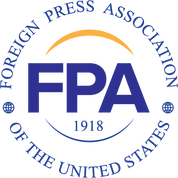CODE OF ETHICS as written by the Society of Professional Journalism
All FPA members are expected to conform to the following Code of Ethics.
PREAMBLE
Members of the Society of Professional Journalists believe that public enlightenment is the forerunner of justice and the foundation of democracy. Ethical journalism strives to ensure the free exchange of information that is accurate, fair and thorough. An ethical journalist acts with integrity.
The Society declares these four principles as the foundation of ethical journalism and encourages their use in its practice by all people in all media.
SEEK TRUTH AND REPORT IT
Ethical journalism should be accurate and fair. Journalists should be honest and courageous in gathering, reporting and interpreting information.
Journalists should:
https://www.spj.org/ethicscode.asp
PREAMBLE
Members of the Society of Professional Journalists believe that public enlightenment is the forerunner of justice and the foundation of democracy. Ethical journalism strives to ensure the free exchange of information that is accurate, fair and thorough. An ethical journalist acts with integrity.
The Society declares these four principles as the foundation of ethical journalism and encourages their use in its practice by all people in all media.
SEEK TRUTH AND REPORT IT
Ethical journalism should be accurate and fair. Journalists should be honest and courageous in gathering, reporting and interpreting information.
Journalists should:
- Take responsibility for the accuracy of their work. Verify information before releasing it. Use original sources whenever possible.
- Remember that neither speed nor format excuses inaccuracy.
- Provide context. Take special care not to misrepresent or oversimplify in promoting, previewing or summarizing a story.
- Gather, update and correct information throughout the life of a news story.
- Be cautious when making promises, but keep the promises they make.
- Identify sources clearly. The public is entitled to as much information as possible to judge the reliability and motivations of sources.
- Consider sources’ motives before promising anonymity. Reserve anonymity for sources who may face danger, retribution, or other harm, and have information that cannot be obtained elsewhere. Explain why anonymity was granted.
- Diligently seek subjects of news coverage to allow them to respond to criticism or allegations of wrongdoing.
- Avoid undercover or other surreptitious methods of gathering information unless traditional, open methods will not yield information vital to the public.
- Be vigilant and courageous about holding those with power accountable. Give voice to the voiceless.
- Support the open and civil exchange of views, even views they find repugnant.
- Recognize the special obligation to serve as watchdogs over public affairs and government. Seek to ensure that the public’s business is conducted in the open, and that public records are open to all.
- Provide access to source material when it is relevant and appropriate.
- Bodly tell the story of diversity and the magnitude of the human experience. Seek sources whose voices we seldom hear.
- Avoid stereotyping. Journalist should examine the ways their values and experiences may shape their reporting.
- Label advocacy and commentary.
- Never deliberately distort facts or context, including visual information. Clearly label illustrations and re-enactments.
- Never plagiarize. Always attribute.
https://www.spj.org/ethicscode.asp
Code of Conduct
FPA/FPF Rules of Conduct
It is essential that officers and members of the Foreign Press Association and Foreign Press
Foundation conduct themselves in ways that ensure both organizations will be able to achieve
their respective missions for the next 100 years.
Every officer and member of the FPA/FPA are required to act subject to:
In the event, a member is expelled from either organization – membership dues will be forfeit – and additional actions including the notification of members of the officer or member’s expulsion from the organization.
It is essential that officers and members of the Foreign Press Association and Foreign Press
Foundation conduct themselves in ways that ensure both organizations will be able to achieve
their respective missions for the next 100 years.
Every officer and member of the FPA/FPA are required to act subject to:
- All Federal and State Laws
- Federal and State regulations governing the operation of not-for-profit organizations under which the FPA and FPF are incorporated
- Policies the FPA/FPF are required to follow
- Ethics rules governing journalists
- FPA/FPF bylaws approved by board or past boards used to govern the FPA/FPF operations
- Rules and approaches voted on by the respective boards/committees to address issues that may not be covered by the bylaws
- Federal and State rules to prevent and disclose nepotism, conflicts of interest, self-dealing and discrimination or harassment on the basis of sexual orientation, religion or race
- Applicable employment laws regarding employees, contractors and officers
- Subject to the FPA gift policy
- Reasonable steps to ensure the security of FPA/FPF technology and systems
- Ensure the privacy, and non-disparagement of the intellectual property of the organization
- Notification to members if information security has been compromised
- Travel and expenses policies
- Conduct that ensure that others do not feel they are subject to harassment of any form
- A thorough review of behaviors or actions that are not consistent with these requirements and commitment not to retaliate against any individual raising concerns or issues
In the event, a member is expelled from either organization – membership dues will be forfeit – and additional actions including the notification of members of the officer or member’s expulsion from the organization.
